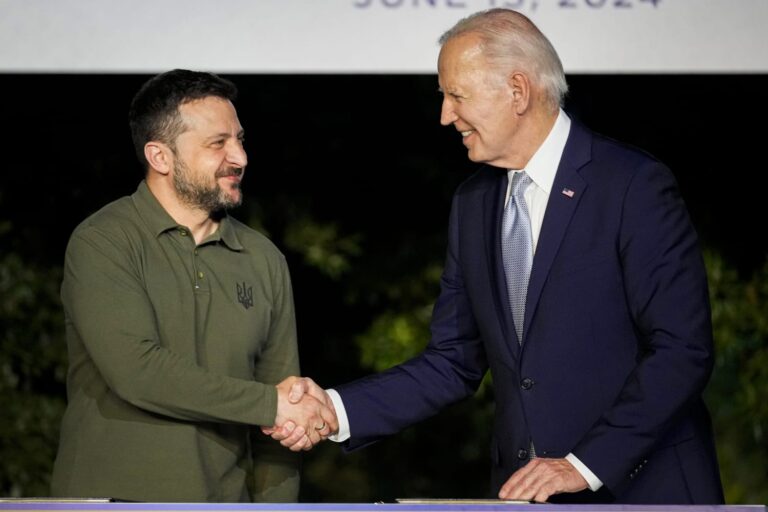BARI, Italy — President Joe Biden and Ukrainian President Volodymyr Zelensky signed a 10-year bilateral security pact at an international summit Thursday that also included an agreement on billions of dollars in loans to protect Kyiv from Russian aggression.
“We will not back down. In fact, we will stand together against this illegal aggression,” Biden said at a joint news conference with Zelensky on Thursday evening.
Biden and the leaders of the wealthiest democracies also agreed on Thursday to provide Ukraine with $50 billion in loans this year secured by frozen Russian assets, demonstrating a firm commitment to defeating Russian aggression, U.S. officials said.
The money will be used for military aid, humanitarian assistance and the country’s reconstruction as it struggles to maintain its independence following Russian aggression, Biden administration officials said at a news conference.
Biden said the security pact, combined with the loan agreement, would strengthen Ukraine and send a clear message to Russian President Vladimir Putin, who launched an invasion of Ukraine more than two years ago.
“He can’t wait for us, and he can’t divide us,” Biden said. “We’re going to stand with Ukraine.”
The security pact may not be as permanent as Biden has suggested. Its future will depend on the outcome of the US presidential election. Republican presidential candidate Donald Trump, who sought a friendly relationship with Putin during his four years in office, could choose to withdraw from the agreement if he beats Biden in November.
” [the security agreement] “What will happen if there is a second Trump administration? Probably not much will happen,” retired Lt. Col. Alexander Vindman, who served as Trump’s European affairs director and has been a frequent critic of the former president, said in an interview. “But once we have a Democratic administration and we get past Trump and MAGA, I think there will be some consistency in U.S. support for Ukraine.”
At home, Biden’s internationalist approach to foreign policy could be ignored depending on the election outcome.
As president, Trump has frequently clashed with G7 allies and, if he returns to office, some former aides believe he could pull the U.S. out of the NATO alliance, which has served as a bulwark against Russian aggression.
Zelenskiy said at a news conference that he sees the new security pact as a “bridge” to joining NATO, the post-World War II military defense alliance. That won’t happen anytime soon: Biden has previously said Ukraine can’t join NATO as long as it remains at war with Russia.
Biden administration officials have said the United States is prepared to commit the full $50 billion if necessary but hopes other countries are willing to share the risk. The loan would be secured by interest accrued on about $300 billion in frozen Russian assets.
“How will they pay it back? Russia will pay it,” the official said.
The loan agreement was formally announced on Thursday at a summit of the Group of Seven (G7) advanced industrial democracies, which include Germany, Japan, France, Britain, Canada and Italy.
“The situation on the battlefield remains severe and there was a shared understanding among G7 nations that Ukraine would require significant financial assistance into next year and beyond if the war continues,” said the official, who spoke on condition of anonymity.
Negotiations on the initiative have been taking place since Russian troops invaded Ukraine in February 2022, but the political uncertainty may have given the talks new urgency. Biden faces a tough re-election fight and, if he loses, this would be his last G7 meeting.
“This summit is our best opportunity to come together and act to close the gap by placing the burden on Russia, not our taxpayers,” a Biden administration official said.
Ukraine’s Western allies want to isolate Russia through sanctions and diplomatic warnings to countries that might back Putin’s regime.
Asked at a press conference whether China had supported Russia’s wartime activities, Zelensky said he had “spoken with the Chinese leader on the phone,” referring to Chinese President Xi Jinping.
“He said he would not sell any weapons to Russia,” Zelenskiy said.
“If he’s an honorable man, he won’t, because he promised me that.”
The Chinese Embassy in Washington, D.C., did not immediately respond to a request for comment on Zelenskiy’s remarks.
Biden’s visit to Italy is short — he arrives late Wednesday and leaves Friday evening — and his schedule is packed with meetings, with those outside Ukraine focused on global infrastructure projects and what Western officials say is China flooding the market with goods.
A personal highlight of Biden’s visit will likely be his meeting with Pope Francis, who will also attend the summit and discuss the risks posed by artificial intelligence. Biden, a devout Catholic, said he met with Pope Francis in Rome in 2021 and the pope told him he should receive Holy Communion. But conservative U.S. bishops have argued that Biden’s pro-abortion rights stance should disqualify him from Communion.
Biden’s second trip to Europe this month comes at a tumultuous time both politically and personally: The day before the president departs, his son, Hunter Biden, was convicted of three drug-related firearms felonies.
Asked about his son during a press conference on Thursday, Biden said he had no plans to pardon or commute Hunter’s sentence.
“I’m incredibly proud of my son, Hunter,” the president said. “He’s overcome his addiction, and he’s one of the smartest, most decent men I know.”

